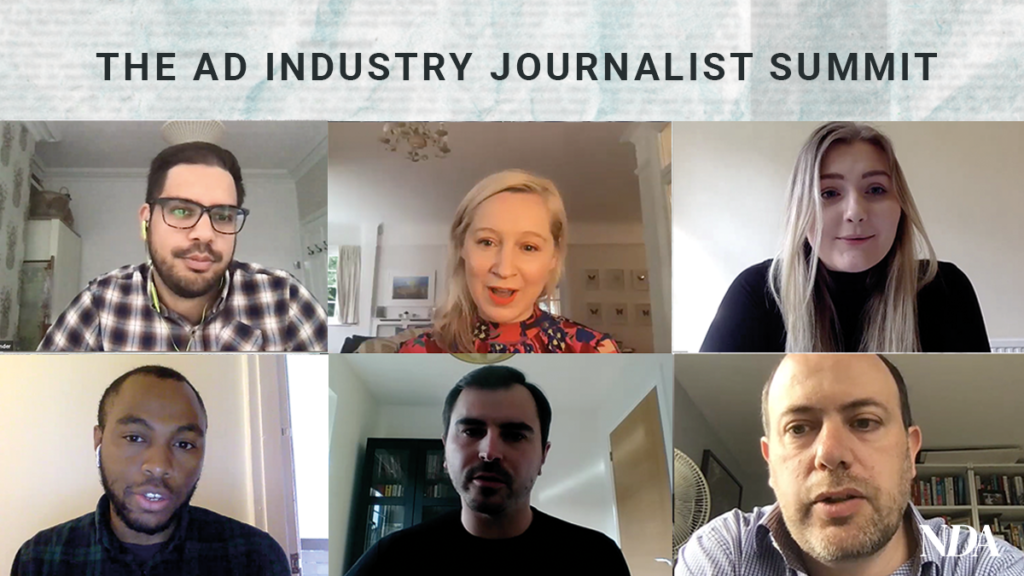The NDA Journalism in the Marketing and Ad Industry Roundtable Summit brought together our industry’s leading journalists to discuss the vital role journalism plays in both supporting and holding to account our industry. We’ll be running a series of articles over the next week generated by the debate.
Does the media and marketing industry have the trade press it deserves?
The first article in our series, supported by Teads, explored the value of independent journalism, now our panel focuses on the changing nature of content within our trade press.
The session included commentary from Digiday Brands Editor Seb Joseph, Creativebrief’s Editorial Director Nicola Kemp, Campaign Editor-In-Chief Gideon Spanier, The Drum’s Head of Content, Cameron Clarke and Mediatel News’s News Editor Michaela Jefferson and was moderated by NDA editor Justin Pearse.
They question the value of ‘breaking news’ against insight within the ad industry, but believe that the diverse set of titles that cater to media, marketing and advertising mean that both timeliness and deeper detail are available to all.
The need for speed, or the devil in the detail?
Questioned whether speed to publication led to mistakes or poor attention to detail, Spanier believes there is a balance to be met.
“This is a very valuable industry,” states Spanier, highlighting the value of the advertising sector at around $600 billion, which allows for a broad spectrum of reporting.
“It’s a really interesting industry and we get access to these smart people [who] are building really interesting businesses. And at this time of COVID, they’re being stretched and challenged in amazing ways, some very difficult ways.”
He says that titles must be “judicious” in what news they choose to cover and that an independent press has a duty to publish without fear or favour.
“There are plenty of stories that companies don’t really want discussed,” he says. “Over Black Lives Matter, for instance, there’s been some reporting, which has shone a pretty stark spotlight on companies’ poor performance on representation Some companies have been called out by members of their own staff and we’ve reported on that.
So, I don’t think that journalism has dumped the tough questions – but should all of us be going at it even harder? Yes.”
Clarke agrees, stating that following the events of recent months, publications are now no longer able to ‘sweep under the carpet’ some issues and that readers will expect a harder line of reporting.
“People are finding their own voice and going to powerful people within their own organisations and demanding change. When we see that from the industry, we cannot ignore it and we need to use our platforms as vehicles to get those stories out there.”
Joseph, however, is less concerned with breaking news stories than dissecting issues. He says an over-reliance on simply “breaking” the news can “short change” reader due to the speed of reporting restricting the time to analyse and offer detail.
“We’re in the business of details and being able to understand a topic before writing it, in order to cover off all the important issues that are affecting it, is much more important than breaking it,” he says, claiming that the commoditisation of news has led to a desire to report first, a mind-set he eschews. “I want to have the best version because that is what generates the best value and is what keeps readers coming back.”
The integrity and unbalanced scrutiny at the heart of our media
If a company merely wants its announcements published without pushback it now has the opportunity to do so on its own website and social media channels such as LinkedIn, although as Spanier points out, the readership will likely be far smaller and less trusted.
As a result, the production of thought leadership has grown as business professionals aim to make a name for themselves, their own abilities and thematic leanings – but Clarke doesn’t see this content as ‘journalism’, with it being published without unbiased scrutiny.
“There’s a diverse range of voices out there on places like LinkedIn and Twitter, and there’s some very good commentators, there’s some people who’ve been able to build a platform of their own, that they would never have been afforded otherwise depressingly in a mainstream publication, and it’s taken them to go and do that themselves to have that voice,” he says.
“And that is a fantastic thing. But when I when I go on my LinkedIn feed I see some really smart thinking, but I also see a lot of things that don’t fill me with the same kind of encouragement – I don’t think that’s a comment on the state of journalism, that’s just a comment on the state of public discourse in in general.”
There is a middle ground, whereby trade titles are curating these individual voices for their readerships, a topic to be explored later in this series.









